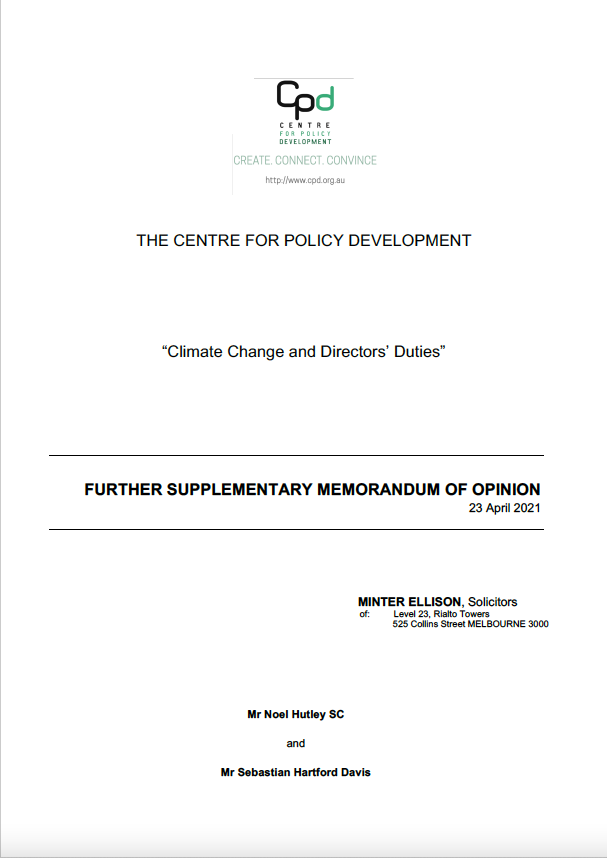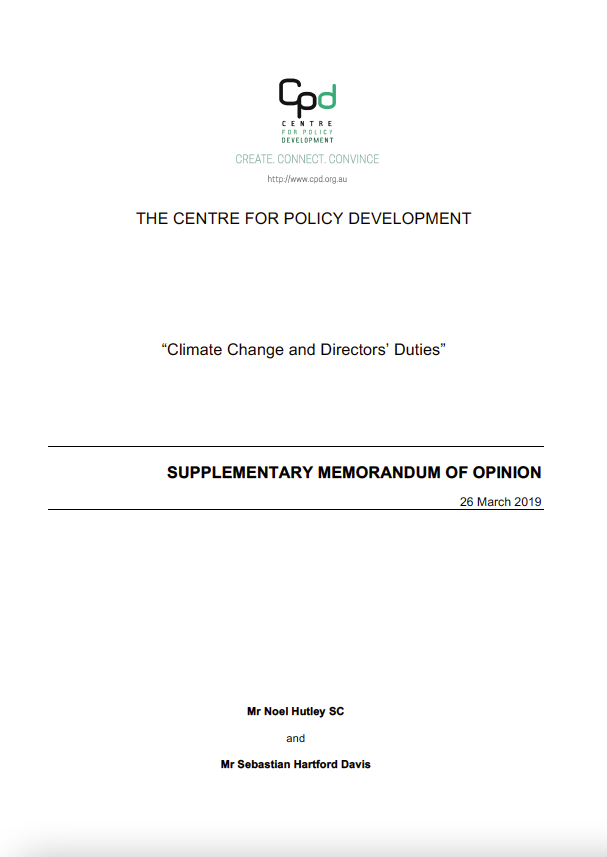Today, the Centre for Policy Development has released a range of new materials relating to directors’ duties and climate change that have emerged from a special roundtable convened by CPD in December 2020. That discussion, which brought together senior legal experts, company directors, business leaders and union and public sector representatives, considered key climate-related challenges for boards and businesses, and priorities for delivering more proactive and ambitious responses.
The materials released today include a new supplementary legal opinion by Noel Hutley SC and Sebastian Hartford Davis on climate change and directors’ duties, building on their landmark 2016 and 2019 opinions on company directors’ duties to consider, disclose and respond to climate-related risks. This latest analysis emphasises that the bar for directors continues to rise amidst surging global action on climate, and highlights legal risks associated with “greenwashing” – including around corporate net zero emissions commitments – as scrutiny of climate-related targets grows. The full set of roundtable materials, participants and conclusions are available below along with the updated legal opinion.
December 2020 roundtable with Noel Hutley SC and colleagues on directors’ duties and climate change
Our 2020 roundtable examined critical challenges and flash points for directors and trustees seeking to meet their climate-related obligations. Participants included Tim Reed (President of the Business Council of Australia), Sam Mostyn (Chair, Citi), Angus Armour (Managing Director and CEO of the Australian Institute of Company Directors), James Pearson (CEO of the Australian Chamber of Commerce and Industry) and Catherine Bolger (President, Australian Institute of Superannuation Trustees). The discussion was conducted under the Chatham House Rule.
The discussion was built around three hypothetical scenarios designed to tease out key legal and practical questions faced by company directors and other decision makers.
Key conclusions from the discussion (which have been prepared by CPD and do not necessarily reflect the views of the participating individuals and institutions) were:
- ‘Greenwashing’ on climate creates clear legal risks. Greenwashing can constitute misleading or deceptive conduct, including for organisations selectively disclosing their exposures or not taking credible steps to operationalise net zero commitments. Care needs to be taken to ensure that climate-related targets and analysis are rigorous, underpinned by appropriate governance, strategy and action, and reflected in financial statements as required
- Superannuation funds can play a catalytic role in supporting the climate transition and should prepare for greater scrutiny of their climate-related governance and risk management. Recent developments, including the REST settlement, have highlighted the need to mainstream climate risks as a core focus of governance and risk management, especially as the investment risks and opportunities related to climate become increasingly dynamic and complex. As universal owners, superannuation funds have a major interest in supporting an economically and socially sustainable zero carbon transition.
- Industry-level collaborations on climate must consider the implications of competition law but, if properly managed, these issues should not impede collective action to address climate change. There is growing enthusiasm to collaborate across sectors and supply chains to develop and roll out low-emissions technology, and to design and deliver industry-level net zero pathways. In some circumstances, coordination between competitors, on climate as on other issues, may constitute cartel conduct, but exemptions and authorisations are available. Provided collaborative initiatives across industries and sectors are mindful of these provisions and proactively address them, competition law need not represent a major obstacle to collaboration on climate.
Further information on the roundtable agenda, hypothetical scenarios and participants are available below, along with a detailed summary of conclusions and reflections from roundtable participants.
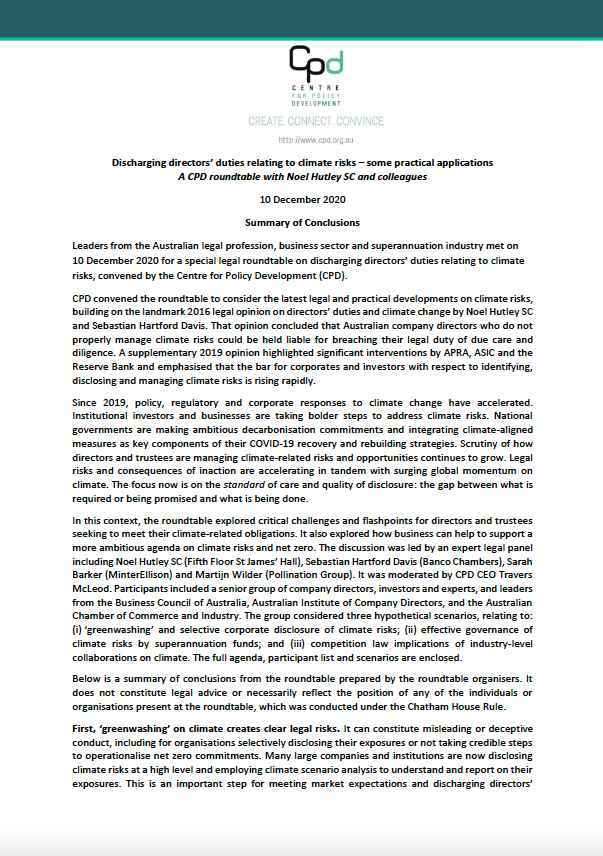 |
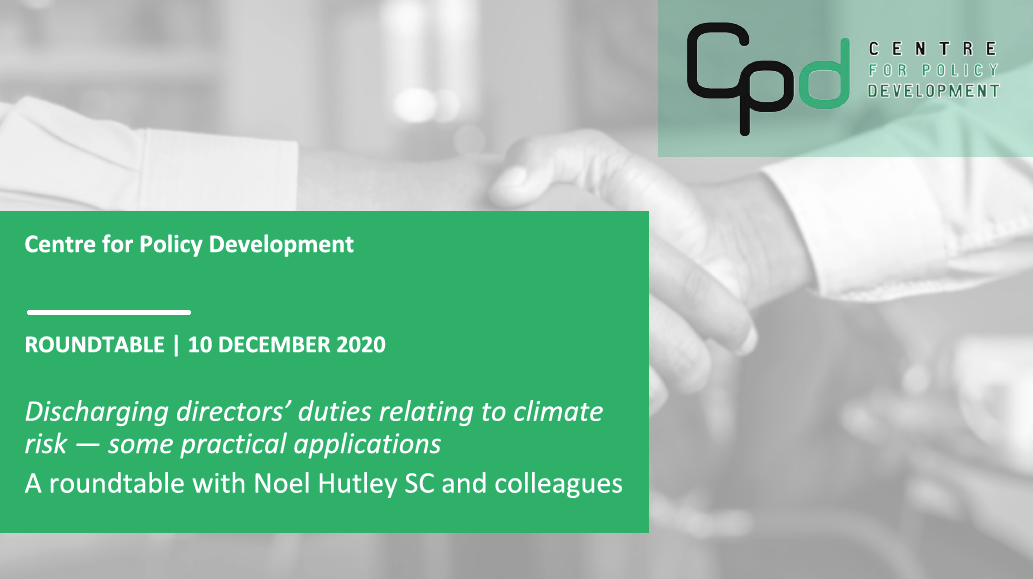 |
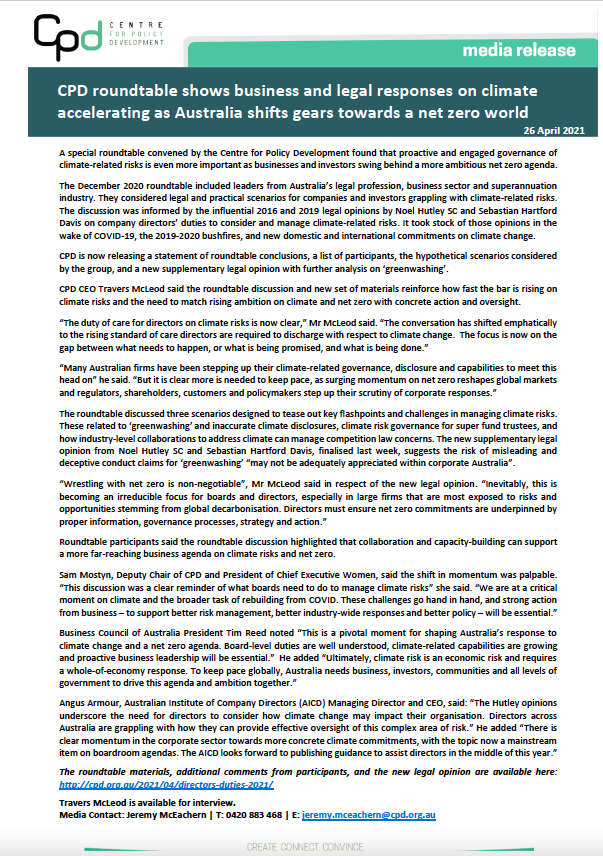 |
||
| Summary of Conclusions | Agenda & Hypothetical Scenarios | Media Release |
New supplementary legal opinion by Noel Hutley SC and Sebastian Hartford Davis
Following the roundtable, CPD commissioned an updated legal opinion by Noel Hutley SC and Sebastian Hartford Davis to further examine key legal questions that were highlighted during the discussion.
The new supplementary opinion, which was provided on instruction from Sarah Barker of MinterEllison, builds on earlier Hutley-Hartford Davis opinions released by CPD in 2016 and 2019. The landmark 2016 opinion found that directors who do not properly manage climate risks could be held liable for breaching their legal duty of due care and diligence. A supplementary 2019 opinion emphasised that the standard of care expected of directors in addressing climate risks had been raised by a series developments, and that directors’ exposure to climate change litigation was “increasing, probably exponentially, with time”.
The new supplementary opinion emphasises the increasing standard of care expected of directors in managing climate-related risks and opportunities, and highlights legal risks surrounding “greenwashing”, especially as scrutiny of climate-related disclosures and commitments grows.
Its key findings are:
- The standard of care to be exercised by directors with respect to climate change has “risen and continues to rise”;
- Net zero commitments by companies are becoming common and appear to be regarded by many directors as an appropriate or necessary step in the discharge of their duties;
- Companies making net zero commitments should have “reasonable grounds” to support the representations contained within them – otherwise, a company (and its directors) could be found to have engaged in misleading and deceptive conduct;
- There are practical steps companies and directors can take to reduce the likelihood of liability arising from a net zero commitment.
Reflections from roundtable participants and key excerpts from the new supplementary opinion
Reflections from roundtable participants:
“This discussion was a clear reminder of what boards need to do to manage climate risks… We are at a critical moment – on climate and on the broader task of building a more resilient and sustainable economy as we emerge from the COVID pandemic. These challenges go hand in hand and proactive leadership from business – to support better risk management, better industry-wide action and better policy – will be essential.” Sam Mostyn, Deputy Chair, CPD
“The Hutley opinions underscore the need for directors to consider how climate change may impact their organisation. Directors across Australia are grappling with how they can provide effective oversight of this complex area of risk. There is clear momentum in the corporate sector towards more concrete climate commitments, with the topic now a mainstream item on boardroom agendas.” Angus Armour, CEO, AICD
“The roundtable facilitated by CPD demonstrated that the bar continues to rise for directors on managing climate risk. This is a pivotal moment for shaping Australia’s response to climate change and a net zero agenda. Board-level duties are well understood, climate-related capabilities are growing and proactive business leadership will be essential. Ultimately, climate risk is an economic risk and requires a whole-of-economy response. To keep pace globally, Australia needs business, investors, communities and all levels of government to drive this agenda and ambition together.” Tim Reed, President, BCA
Key quotes from legal opinion:
“In our opinion, it is no longer safe to assume that directors adequately discharge their duties simply by considering and disclosing climate-related trends and risks; in relevant sectors, directors of listed companies must also take reasonable steps to see that positive action is being taken: to identify and manage risks, to design and implement strategies, to select and use appropriate standards, to make accurate assessments and disclosures, and to deliver on their company’s public commitments and targets.” – [4]
“Companies making net zero commitments require “reasonable grounds” to support the express and implied representations contained within such commitments at the time those commitments are made. It is foreseeable that a company (and its directors) could be found to have engaged in misleading or deceptive conduct or other breaches of the law by not having had reasonable grounds to support the express and implied representations contained within its net zero commitment. – [7.4 and 7.5]
“In our view, risks relating to greenwashing do not mean it is safer for directors to avoid making net zero commitments. Directors will need to consider in a robust way whether such a commitments is in the best interests of the company. Indeed, given the developments cited above, the risks of inaction on this front appear to be profound. – [40]
“Accelerating impacts of climate change, and responses to climate change overseas and domestically, are profoundly influencing, positively and negatively, the interests of many Australian businesses. It is now perfectly clear that reasonable directors and firms should foresee these risks. We would caution against any misrepresentation about the steps such directors and firms may be taking in response.” – [51]
Media Coverage
Directors liable for ‘greenwashing’ disclosures, Michael Roddan, AFR, 26 April 2021
Business leads where politics fail on climate, AFR, 25 April 2021
Companies warned that ‘greenwashing’ could have legal consequences, James Fernyhough, RenewEconomy, 26 April 2021
Links and related reading
The Climate & Recovery Initiative
CPD business roundtable on climate and sustainability, 2019
Remarks by Ken Hayne at CPD business roundtable on climate and sustainability, 2019
Climate change and the economy, speech by RBA Deputy Governor Dr Guy Debelle, March 2019
Climate change, speech by ASIC Commissioner John Price, June 2018
The weight of money: a business case for climate risk resilience, APRA Executive Member Geoff Summerhayes, November 2017
CPD roundtable on directors duties, climate risks and sustainability (2016)
Heavyweights now speaking with one voice on climate change risks, Sam Hurley, The Age and The Sydney Morning Herald, 24 March 2019
Directors’ climate liability exposure increasing ‘exponentially’, Ben Potter, Australian Financial Review, 29 March 2019
Climate change raising company liabilities, barristers warn, Peter Ryan, ABC RN The World Today, 29 March 2019
Time for an Australian Sustainable Finance Taskforce, Travers McLeod and Sam Hurley, Sydney Morning Herald, 22 July 2019

